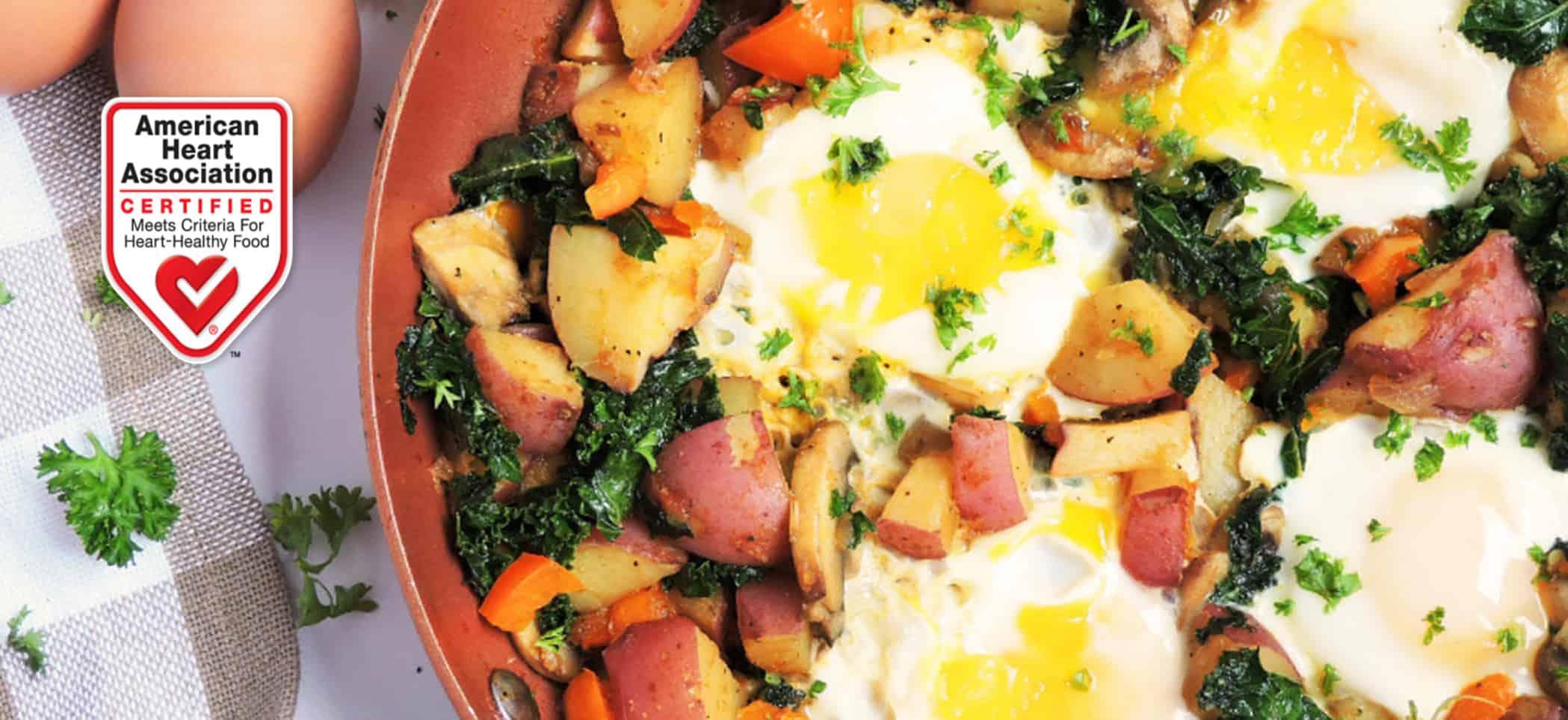Food waste is a major concern in the United States with more than 30% of our food tossed out1, which is about 20 pounds of food per person per month!2
This wasted food impacts the environment, our natural resources, and certainly, your spending. As we head into a new year, you might consider a new year’s resolution that can benefit more than just you: keep eggs on hand to help you reduce your food waste.
Eggs can help cut down on food waste as they are versatile and combine easily with other foods. Eggs are a favorite at breakfast and we are just starting to appreciate the opportunities of dinner eggs. Eggs can be combined with a variety of vegetables, grains, and dairy foods to create delicious meals, which can be especially valuable when these food items would otherwise be tossed because they are at the end of shelf-life. Often times, even fruits and vegetables that are past their prime in terms of appearance may be acceptable for cooking.2 Instead of tossing out the vegetables that have been in the refrigerator too long, #honortheharvest and combine these vegetables with eggs for a quick meal:
- Country Veggie Breakfast Skillet is a veggie-packed breakfast skillet topped with sunny-side eggs. This recipe, developed by Egg Enthusiast Andrea Mathis, MA, RDN, LD, is certified by the American Heart Association and it is easy to swap in your extra veggies you happen to have on hand. Heart-Check certification does not apply to research or scientific statements unless expressly stated.
- Vegetarian Fried Rice is fast and versatile. This recipe was developed for the Egg Nutrition Center by one of our Egg Enthusiasts, and is a perfect recipe for your go-to box on busy weeknights. For an alternative option, try Easy Vegetable Fried Quinoa developed by Andrea Mathis, MA, RDN, LD.
Besides reducing food waste, pairing eggs with vegetables is demonstrated to have a nutritional benefit, beyond the nutrients provided by eggs. Recent work at Purdue University sponsored by the Egg Nutrition Center showed that when eggs are consumed with salad, absorption of carotenoids and vitamin E are enhanced.3,4 This nutritional benefit and other new egg science was recently discussed by ENC’s Executive Director Mickey Rubin on Sound Bites, in collaboration with Registered Dietitian Melissa Joy Dobbins.
Importantly, if you are pairing eggs with leftover produce, it is important to make sure your eggs are safe to eat. Most egg cartons have a “Best By” date stamped on the side which indicates when the eggs will be at their highest quality, but eggs remain safe to eat when stored in the refrigerator for up to 5 weeks.5,6 Of course, if the eggs or vegetables are rotten, skip the veggie-egg combination and dispose of the unsafe food. Many communities have organic recycling programs that can divert these foods from the landfill.
Please visit our website for more ways to put an egg on it!
References
- Buzby, J.C., H.F. Wells, and J. Hyman. The Estimated Amount, Value, and Calories of Postharvest Food Losses at the Retail and Consumer Levels in the United States. 2014 17-Dec-19]; Available from: https://www.ers.usda.gov/webdocs/publications/43833/43680_eib121.pdf?v=0.
- U.S. Food and Drug Administration. How to Cut Food Waste and Maintain Food Safety. 2019 December 13, 2019]; Available from: https://www.fda.gov/food/consumers/how-cut-food-waste-and-maintain-food-safety.
- Kim, J.E., M.G. Ferruzzi, and W.W. Campbell, Egg Consumption Increases Vitamin E Absorption from Co-Consumed Raw Mixed Vegetables in Healthy Young Men. J Nutr, 2016. 146(11): p. 2199-2205.
- Kim, J.E., et al., Effects of egg consumption on carotenoid absorption from co-consumed, raw vegetables. Am J Clin Nutr, 2015. 102(1): p. 75-83.
- U.S. Department of Agriculture. Food Product Dating. 2019 2-Oct-19 17-Dec-19]; Available from: https://www.fsis.usda.gov/wps/portal/fsis/topics/food-safety-education/get-answers/food-safety-fact-sheets/food-labeling/food-product-dating/food-product-dating.
- U.S. Department of Health and Human Services. FoodKeeperApp. 2019 17-Dec-19]; Available from: https://www.foodsafety.gov/keep-food-safe/foodkeeper-app.

